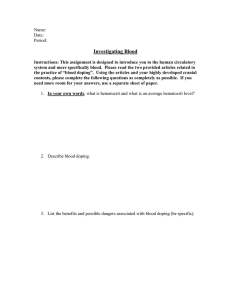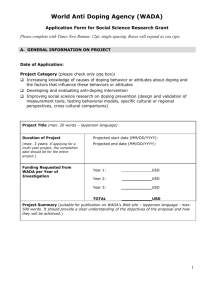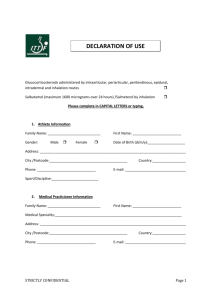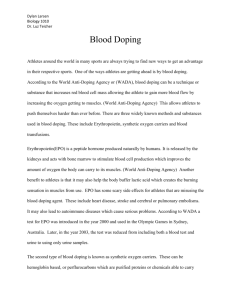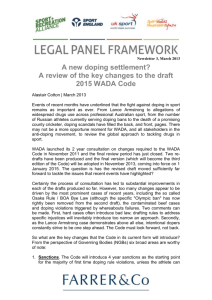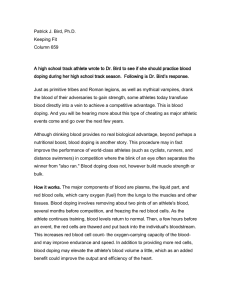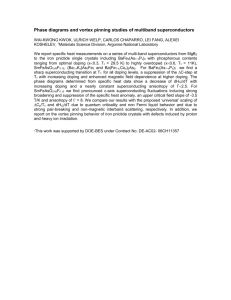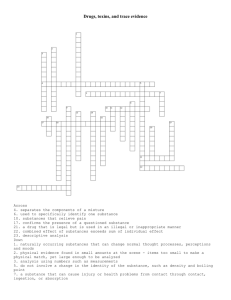Document 11404942
advertisement
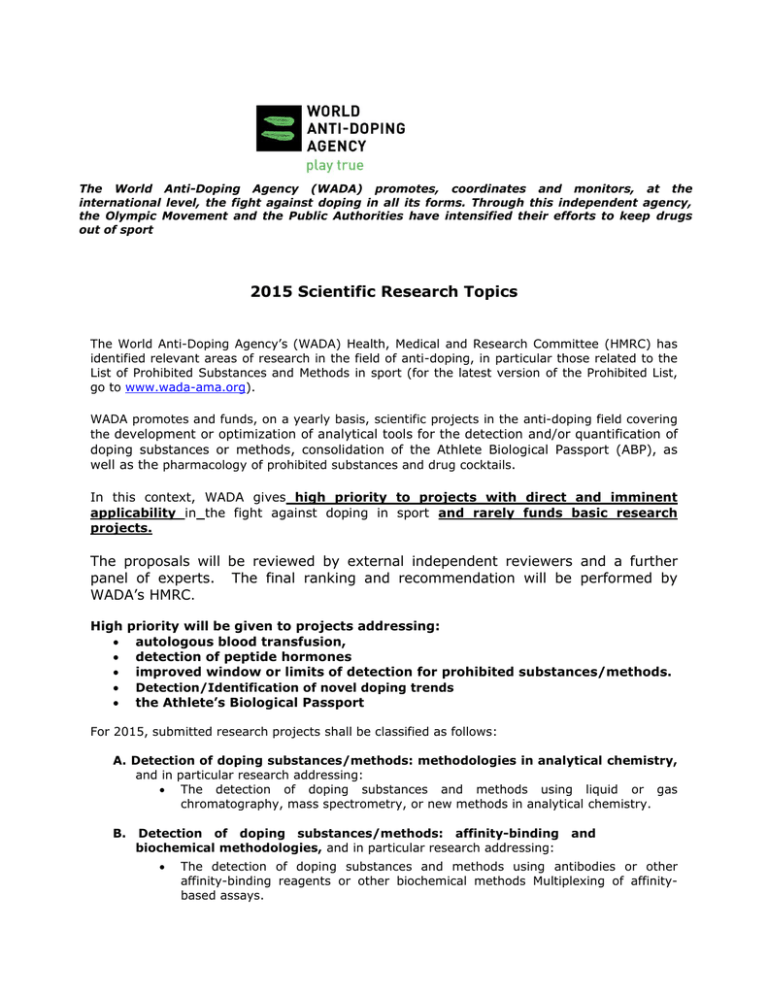
The World Anti-Doping Agency (WADA) promotes, coordinates and monitors, at the international level, the fight against doping in all its forms. Through this independent agency, the Olympic Movement and the Public Authorities have intensified their efforts to keep drugs out of sport 2015 Scientific Research Topics The World Anti-Doping Agency’s (WADA) Health, Medical and Research Committee (HMRC) has identified relevant areas of research in the field of anti-doping, in particular those related to the List of Prohibited Substances and Methods in sport (for the latest version of the Prohibited List, go to www.wada-ama.org). WADA promotes and funds, on a yearly basis, scientific projects in the anti-doping field covering the development or optimization of analytical tools for the detection and/or quantification of doping substances or methods, consolidation of the Athlete Biological Passport (ABP), as well as the pharmacology of prohibited substances and drug cocktails. In this context, WADA gives high priority to projects with direct and imminent applicability in the fight against doping in sport and rarely funds basic research projects. The proposals will be reviewed by external independent reviewers and a further panel of experts. The final ranking and recommendation will be performed by WADA’s HMRC. High priority will be given to projects addressing: autologous blood transfusion, detection of peptide hormones improved window or limits of detection for prohibited substances/methods. Detection/Identification of novel doping trends the Athlete’s Biological Passport For 2015, submitted research projects shall be classified as follows: A. Detection of doping substances/methods: methodologies in analytical chemistry, and in particular research addressing: The detection of doping substances and methods using liquid or gas chromatography, mass spectrometry, or new methods in analytical chemistry. B. Detection of doping substances/methods: affinity-binding biochemical methodologies, and in particular research addressing: and The detection of doping substances and methods using antibodies or other affinity-binding reagents or other biochemical methods Multiplexing of affinitybased assays. C. Pharmacological studies on doping substances/methods, and in particular research addressing: • Establishment and/or refinement of threshold values for prohibited substances showing doping effect above a certain dose or depending on route of administration; • Pharmacokinetics/pharmacodynamics/metabolism of prohibited substances and methods including impact of gender, ethnic, and environmental factors affecting excretion, detection or action; Doping potential and strategies for detection of drug interactions (cocktail formulations) or micro-dosing. Long-term metabolites or markers of doping substances. D. The Athlete’s Biological Passport, and in particular research addressing: Discovery and validation of new discriminant markers. Evaluation of confounding factors E. Detection of doping substances/methods: molecular biology, “Omics” and miscellaneous methodologies, and in particular research addressing: The detection of gene doping and gene manipulation including “in vivo” validation; Validation of molecular and metabolic signatures ‘in vivo” to detect use of prohibited substances and methods Detection of stem cells doping in muscle(s). WADA invites you to submit your application for projects related to the topics above by February 15 2015 (24:00 h GMT). Please use the electronic system “WADAGrants” accessible from https://grants.wada-ama.org/science/home to submit your application. The application shall be submitted in English and shall include the following enclosures. An English translation of documentation should be appended where necessary: A project description (max. 5 pages) including objectives, methodology, experimental design, timelines, preliminary results and relevant bibliographic references; Information about the researchers (curriculum vitae), their home institution, and its resources; *For research involving human subjects and/or human samples (including existing material): a copy of local ethics committee approval, participant information letter and consent form; and *For research involving animals, a copy of animal care committee approval. * If these documents are pending at the time of submission, they will be required once the grant is approved for funding. The full original application form should be printed, signed by all investigators and sent to: Ms Violet Maziar Executive Assistant Science Department/WADA 800, Place Victoria (Suite 1700) PO Box 120 Montreal (Quebec) H4Z 1B7 CANADA All submitted projects will be peer-reviewed by independent external reviewers, a panel of experts, and WADA’s Health, Medical and Research Committee will make the final proposal to WADA’s Executive Committee. A response on the application can be expected by mid-October 2015. WADA will only fund projects deemed appropriate. Prof. Arne Ljungqvist WADA Vice-President Chairman, WADA Health, Medical and Research Committee Mr. David Howman WADA Director General

